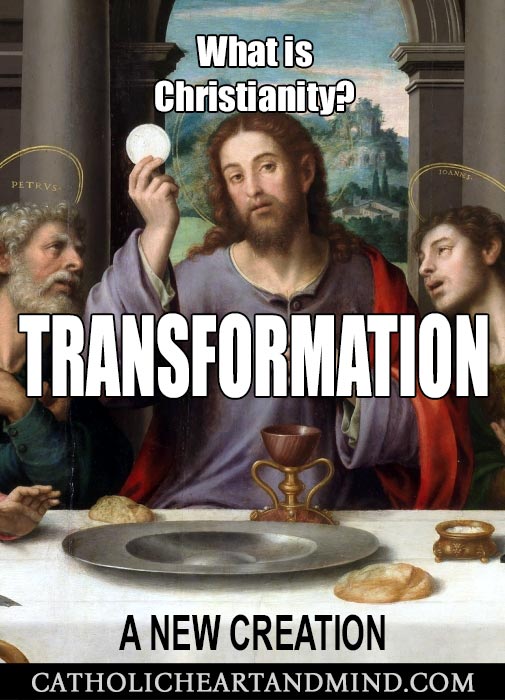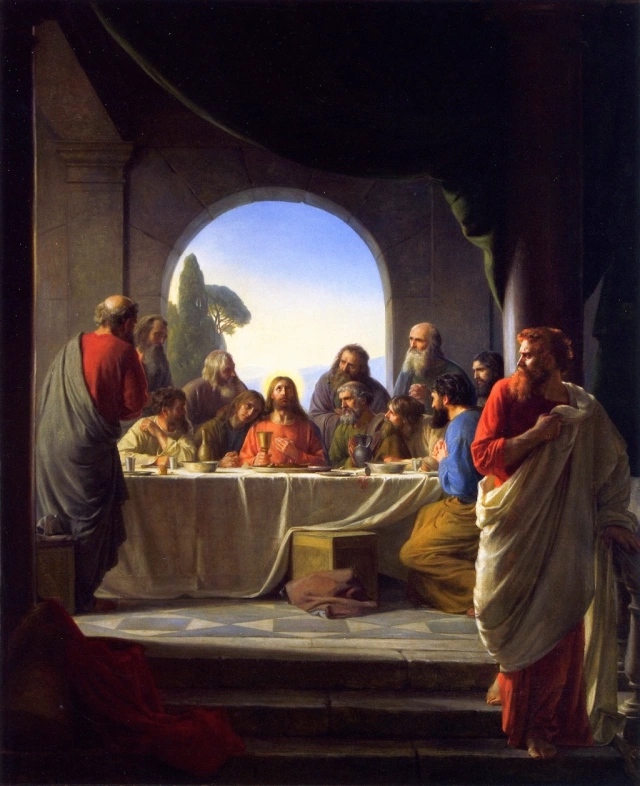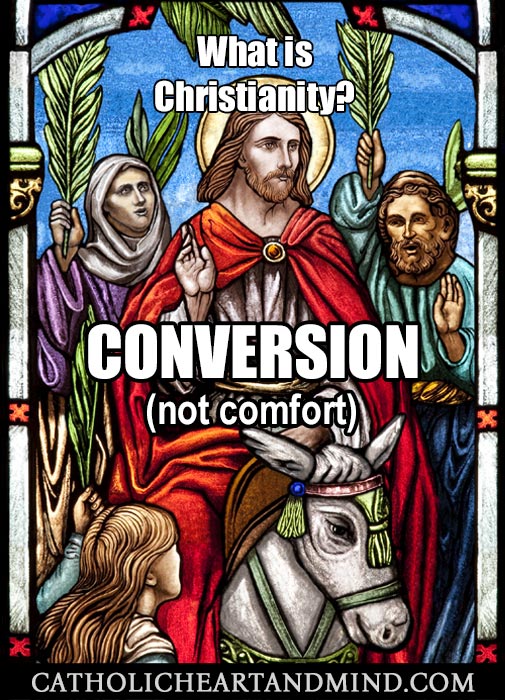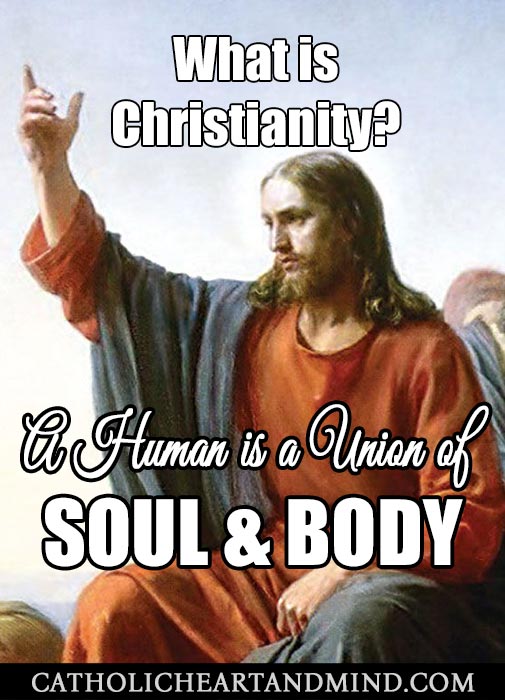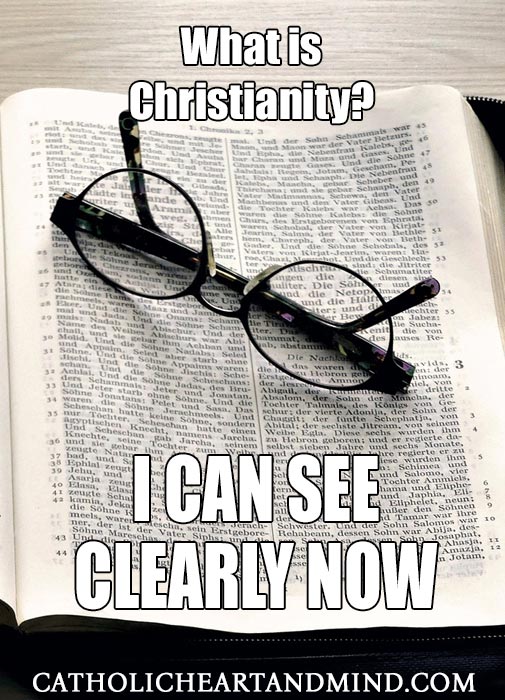+JMJ+ (Our loosely themed Catholicism 101 or What is Christinity series continues.) A Christian anthropology: what would that mean? Christianity does have a certain way of looking at man, at God, at the world, at reality. It is more than a way of looking but, yes, it is a way of looking. It’s a way of describing what reality is. And it is more than describing it. We describe it to think about it and to tell others about it, but we also describe it so we can do something with it or about it in an interior and an exterior way.
Continue reading “It’s about transformation”Category: Series
My First Holy Thursday Experience
+JMJ+ Though this was originally written a few years ago, I’m including it as a re-share in our current Catholic Christianity 101 or What is Christianity series. No other Holy Thursday has affected me as deeply as that first one just two nights before I was to be received into the Church at the Easter Vigil. And so I will share with you again, and for those who have not read it, for the first time, my account, lightly edited, of that evening.
Continue reading “My First Holy Thursday Experience”It’s not about comfort
+JMJ+ (We’re continuing our series on Catholicism 101 or What is Christianity.) People have said to me, people who should know better, but the secular world has gotten to them and their minds have been affected and they have said things like, “I understand why you need religion, it gives you comfort.”
Continue reading “It’s not about comfort”I am a soul who has a body, oh, really?
+JMJ+ (We’re continuing our series What is Christianity? or Catholicism 101.) How many times have you heard someone say it? “I am a soul, I have a body.” That’s not what the Church teaches. Think it doesn’t matter? Oh, but it does. If you think you are a soul who has a body, then you probably think your soul is the more important of the two and that the body is somehow second rate. There is a sense in which this is true. After all, the soul can live without the body, but the body can’t live without the soul. But without the body you would be incomplete. A human person consists of a soul and a body. A better way of saying that would be, a human person is a union of body and soul. *I like to say the words together, well, as close together as I can say them, bodysoul or soulbody. I just can’t seem to say them at the same time. We humans are limited that way, one thing after another, one thing at a time.)
Continue reading “I am a soul who has a body, oh, really?”I can see clearly now
+JMJ+ (This week our informal series, What is Christianity, continues.) I wear glassess. When I was younger, before the days of plastic lighter weight lenses, I wore thick glass glasses. They were heavy, too. But without them I couldn’t see two feet in front of me. My third-grade teacher had observed that I couldn’t see the chalkboard at school so I had to move my desk right up next to the board when an assignment required reading it. That was embarrassing. But that same teacher told my parents about my poor vision and that’s how I got my first pair of glasses. What a difference they made. And not just in the classroom. I was amazed at all the things I could see now. Is this the way it had been all this time? I never knew!
Continue reading “I can see clearly now”The Stations of the Cross
+JMJ+ We’re continuing our What is Christianity series tonight. I’ve shared some lectures with you and some thoughts of my own. Tonight there’s no lecture and no me trying to be a philosopher. Tonight I’m sharing a memory with you and then sharing something beautiful with you, at least, I hope you find it as beautiful as I did and do.
If you’ve been Catholic for a while, you’ve probably taken part in the Friday devotions of Lent and I don’t mean just the fish fry dinners. I mean the Stations of the Cross, reading the words in one of those little booklets, turning to face each station on the wall.
Continue reading “The Stations of the Cross”Christ didn’t suffer so that we don’t have to
+JMJ+ It’s Lent, the season of suffering, one could say, and it seems like a good time to mention this in our ongoing Catholic Christianity 101 or What is Christianity series. This one is more, perhaps, about how to be a Christian and less about what Christianity is, but I’m going for it anyway. I know it will contradict what a whole lot of people say—people who should know better but have forgotten or never knew—but Christ did not suffer so that we don’t have to. He suffered so that we could learn how to suffer. More, so that we could suffer and unite our suffering to His redemptive suffering. So we could offer our suffering for the benefit of others. That they may be healed physically, well, yes, if the Lord wills that. But mostly so that they, and we, may be united to Him, now, in this life, and in the next.
Continue reading “Christ didn’t suffer so that we don’t have to”Chalcedon: Humanity or Divinity?
+JMJ+ Ash Wednesday, the beginning of Lent, falls on St. Valentine’s Day this year and what that says to me is this: Lent is all about Love and Love is all about letting go of everything that stands between the Lover and the Beloved. Prefer nothing to Christ, as St. Benedict would say (Rule of Benedict, 4:21). Lent is the perfect time to turn away from the things of this world and focus on His Kingdom which is not of this world, to focus on the things that truly matter. The day is already late and the time to begin, or to begin again, is now.
Continue reading “Chalcedon: Humanity or Divinity?”Road to Nicaea continues
+JMJ+ Welcome! This is the eighth post in a continuing series about Christianity. We’ve talked about how helpful philosophy is when trying to understand Christianity and we began looking at how the Early Church Fathers used philosophy to help them think about the faith, and to steer them clear of some really bad ideas that would have dire consequences if not met and stamped out right then and there. But some of those ideas never were completely stamped out and we’re dealing with them in our societies today. I’m going to post the next lecture links in this post, then I’ll point out some things about last week’s lecture. I suppose that means I’ll write about this lecture in next week’s post. You’re used to my ways by now, right? ;)
Continue reading “Road to Nicaea continues”Prelude to Nicaea
+JMJ+ Welcome! This is the seventh post in a continuing series about Christianity. We’ve been talking about how helpful philosophy is when trying to understand Christianity. This week we’ll talk about how important philsophy has been in Christianity, particularly in the early years of its history and formation. But I’m going to step back and let someone else do the talking, someone I stumbled onto many years ago, and I hope you’ll enjoy listening to him as much as I do.
Continue reading “Prelude to Nicaea”Who needs philosophy?
+JMJ+ Somebody reading this series (if somebody is reading this series) is probably saying right about now, “But what about Christianity? When are you going to get to that? Why talk about good and goodness? Get on with it already!” Listen, there are some things we need to understand before we get into Christianity itself. And if we just start throwing terms around without defining them or attempting to understand them, we could end up discussing something but it might not be Christianity and that would be not merely a waste of time, it could be downright injurious to souls. God gave us faith and reason and we need both if we’re going to understand what we’re doing, what we’re supposed to be doing, where we came from, where we’re headed, and how best to get there.
Continue reading “Who needs philosophy?”Anotha cuppa and a few words about the time I recited the Creed in a coffee shop
+JMJ+ Did I ever tell you about the time I recited the Creed in a coffee shop? I was talking with a young man about religion and belief and I do not remember how we got on the subject. Probably he saw that I was wearing a Catholic T-shirt and reading a Catholic book. A lot of my conversations get started that way. Eventually he said to me, “I don’t know what I believe, do you?”
Continue reading “Anotha cuppa and a few words about the time I recited the Creed in a coffee shop”
